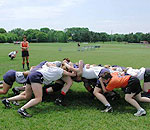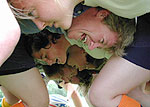By Laurel Druley
Minnesota Public Radio
June 7, 2002
Two Minnesota teams will compete in the national women's Division 1 rugby championship this weekend in Rochester. Six other teams from all over the United States will compete. This is the first year Rochester has hosted a national tournament. The game of rugby is still relatively new to the United States. Fans and players warn the game is highly addictive.
| |
|
|
|
||
Rugby teams tend to have names like the Amazons, the Eagles or the Rogues. But the team from the Big Apple is above that. It's simply the New York club. The team warms up with ball handling drills on the Rochester Community and Technical College campus fields.
At first glance rugby looks a bit like American football. But the differences quickly become clear. No helmets, minimal padding and while you can carry or kick the ball forward, it can only be passed backwards.
In rugby the ball is always passed backwards, so the players rely on constant communication. The clock is always running so communication and speed are crucial.
The New York players train six days a week. Hedwig Aerts, the team captain, has played for seven years. Aerts says rugby gives her a physical work out as well as a mental challenge.
"It makes you become better at everything. It's very tough. It's an intellectual challenge to get 15 players on the same page at pace without any timeouts to call plays. It's a continuous game so everyone is making decisions as you go along," says Aerts.
Aerts just returned from playing in the World Cup in Barcelona, where the U.S. Eagles placed seventh. She'll be competing against some of her Eagle teammates this weekend in Rochester, but she's not concerned.
"Everyone whose made this kind of commitment to this sport is a sister. You understand why they do it and they're one of the few people who understand why you do it," Aerts says.
Aerts is the New York club's fly half. This means she has to run fast and pass accurately.
| |
|
|
|
||
In rugby there are laws, not rules. If a minor law is broken, the referee calls a scrum. Eight players from each team form a phalanx. They then go head to head and try to push the other side off the ball. It's hard, grunting, sweaty work.
"It's the only contact sport that has absolutely no rule differences between men's and women's rugby. Tackle rules are the same. Scrum rules are the same. How it's executed might be a little different. Women's rugby has fewer violent extracurriculars."
Some players will not have to travel as far as the New Yorkers. Erin Brown works in Rochester and plays for the Minnesota Amazons. Brown started playing rugby in college. She was drawn to the sport's all-inclusive nature. There's a position for everyone whether you weigh 90 pounds or 200. She also enjoys the camaraderie of the sport.
"When you trust someone so much on the field - literally there are points when my life is in the hands of teammates. When you have that much trust, it forms a strong bond when our team goes out with each other," says Brown.
Rochester Rogues coach Simon Gibbons helped organize the weekend's event. He says broken fingers and minor injuries are not unusual, but rugby is a tame sport.
"It's also a sport with more sensible rules than football. People are not wearing armor helmets and rules don't allow people to be tackled above the shoulders. The game is played behind the ball; no one is coming across the middle as a wide receiver looking back for the ball and about to have his head taken off. Those kinds of things are discouraged," Gibbons says.
Gibbons began playing rugby when he was 7 in Britain. In many parts of Europe, South Africa and New Zealand rugby is introduced at a young age. In the United States rugby's taken off as a collegiate sport but it's slowly catching on at the high school level. Gibbons and others say while rugby is not far from the Olympics, it will be a while before he sees professional rugby teams in the United States.


